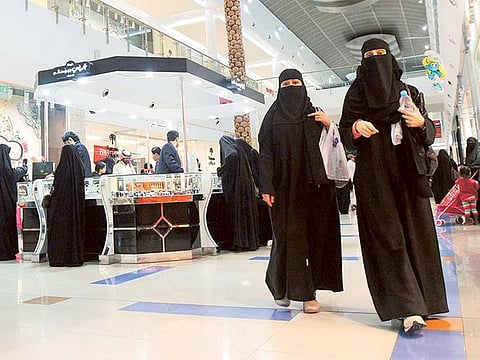Saudi Arabia addresses guardianship abuses towards women
A woman remains a legal dependent on a male relative, needs consent on various aspects

Manama: Saudi Arabia is launching a programme to tackle abuses in the guardianship system and ensure the rights of all individuals, mainly women and children, are protected.
Under the guardianship system, a woman regardless of her age, education level or marital status, remains a legal dependent and thus needs the consent of a male relative - a father, uncle, husband, brother or son - in various aspects of her life.
In May 2017, and as the kingdom embarked on a series of social reforms to help empower women politically, economically and socially, King Salman issued orders to ease restrictions, mainly on access to jobs, higher education and medical procedures.
Saudi Arabia has no laws that prevent women from having access to such services, but some public departments demand the consent of a male relative before providing them.
Conservative parties within the society ensured the reinforcement of the system.
However, the abuse of the guardianship system by some males has prompted Saudi women to report their frustration with the system that places restrictions on what they can do without the permission of a guardian and to call for changes.
On Sunday, a workshop in the capital Riyadh discussed the situation and offered recommendations to deal with abuses in the guardianship powers.
“The Public Prosecution will spare no effort to protect individuals, whether women, children or parents from the unfair treatment of those who abuse the guardianship system,” the kingdom’s public prosecutor Saud Al Mojeb said.
“Abuse victims can resort to statutory powers to initiate criminal proceedings as provided by the regulations in accordance with the Shariah and the instructions of the country’s rulers,” he said at a workshop dedicated to discussing a project to deal with guardianship abuses.
The workshop reviewed the definition of guardianship, the responsibilities and powers of the guardian in the Sharia, and forms of guardianship abuses and their social and psychological impacts, Saudi daily Okaz reported.
Participants also discussed the criminal accountability of abuse as well as the steps to initiate criminal action in cases where women are prevented from getting married or from exercising their legitimate rights.
The participants, who included prosecutors, advisors, Public Prosecution staff, heads of departments, Ministry of Labour and Social Development staff and experts, also discussed the measures to reduce guardianship abuses and the mechanisms of cooperation between social protection departments, specialised sectors and the criminal reconciliation offices in the Public Prosecution.
“The Public Prosecution, in its capacity as one of the justice agencies in Saudi Arabia, is shouldering its responsibility towards the community by adopting awareness and social programmes and projects to contribute to reducing the excesses of those who abuse the guardianship,” Al Mojeb said.
Al Mojeb noted that although only a few complaints had been received about guardianship power abuse, indicating that it was not widespread, the Public Prosecution, by virtue of its competence as the social body representing society, is responsible for filing lawsuits in criminal cases.
“This workshop is in line with the drive of the Public Prosecution to promote awareness of social issues in general and the issue of abuse of the guardianship powers in particular. We look forward to significant recommendations to address the issue of abuses in the guardianship powers.”
The recommendations will be referred to the higher authorities, he added.
Sign up for the Daily Briefing
Get the latest news and updates straight to your inbox



